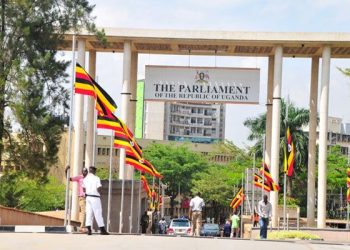The Supreme Court will on Thursday deliver the long-awaited judgment in the age limit appeal. The Supreme Court gives a final say on all legal matters in the country.
According to the notice issued yesterday, addressed to parties in the case, Supreme Court registrar Godfrey Anguandia Opifeni, stated that the verdict will be ready for pronouncement on Thursday at 10:00am.
“Take notice that judgment of this appeal has been fixed for April 18, 2019 at 10:00am. In the afternoon or soon thereafter as court will convene,” Opifeni said.
The registrar warned the parties that “if no appearance is made by yourself, lawyer or someone authorized to act for you, the judgment will be delivered in your absence.”
The appeal was a result of the Constitutional Court verdict last year. A majority威而鋼 justices (4:1) allowed the removal of presidential age limit, but unanimously declared the extension of MPs and local government officials’ tenure as unconstitutional.
The Deputy Chief Justice, Alfonse Owiny-Dollo, Remmy Kasule, Elizabeth Musoke and Cheborion Barishaki called for the removal of the presidential age limit while Justice Kenneth Kakuru dissented.
City lawyer Hassan Male Mabirizi, Uganda Law Society and six opposition MPs, want Constitutional Amendment Act, 2017 which lifted the presidential age limit quashed on grounds that the process of its enactment was flawed.
The six MPs are Gerald Karuhanga (Ntungamo Municipality), Jonathan Odur (Erute South MP), Ibrahim Ssemujju (Kira Municipality), Mubarak Munyagwa (Kawempe South), Allan Ssewanyana (Makindye West) and Winifred Kiiza (Kasese Woman MP), who is also former Leader Of Opposition.
They contend that the justices of the Constitutional Court misconstrued the application of the basic structure doctrine when they found that the qualifications of the president or chairpersons of district local government do not form part of it.
The basic structure doctrine is a judicial principle whereby some basic features of the Constitution cannot be altered or destroyed through amendments by Parliament.
“The justices of the Constitutional Court erred further in according the basic structure doctrine and restrictive application when they held that it only applies to amendments, which require a referendum and specifically to the extension of the term of Parliament,” they argued.
They claim that the supremacy of the Constitution as an embodiment of the sovereign will of the people, political order and stability as well as constitutionalism and rule of law were eroded by the impugned act. The amendment arose from a private member’s Bill by Igara West MP Raphael Magyezi.






























































